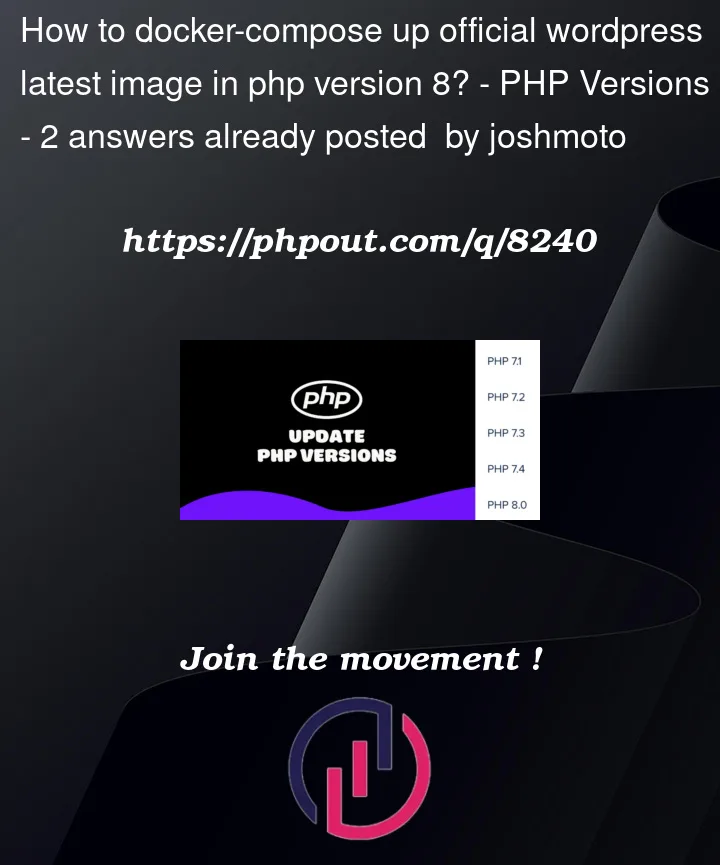I am using dockers official wordpress image to deploy local wordpress environments using docker compose.
After running docker-compose up -d and then running phpinfo() function in my local theme code, the current running php version is 7.4…
But if you look at the official wordpress image repo on github, you can see the latest wordpress version supports php version 8.0…
My question is, how can I deploy my wordpress docker image using php8.0?
Here is my docker-compose.yml file…
version: '3.7'
networks:
wordpress:
ipam:
config:
- subnet: 172.25.0.0/16
services:
# here is our mysql database
db:
image: mysql:5.7
volumes:
- ./db:/var/lib/mysql:delegated
#- ./docker/db-dumps:/docker-entrypoint-initdb.d:delegated
ports:
- "3306:3306"
restart: always
environment:
MYSQL_ROOT_PASSWORD: somewordpress
MYSQL_DATABASE: wordpress
MYSQL_USER: wordpress
MYSQL_PASSWORD: wordpress
networks:
- wordpress
# here is our wordpress server
wordpress:
depends_on:
- db
image: wordpress:latest
volumes:
# our persistent local data re routing
- ./themes/example:/var/www/html/wp-content/themes/example:delegated
- ./plugins:/var/www/html/wp-content/plugins
- ./mu-plugins:/var/www/html/wp-content/mu-plugins
- ./uploads:/var/www/html/wp-content/uploads
- ./uploads.ini:/usr/local/etc/php/conf.d/uploads.ini
ports:
- "80:80"
restart: always
networks:
- wordpress
environment:
# our local dev environment
WORDPRESS_DEBUG: 1
# docker wp-config settings
WORDPRESS_DB_HOST: db:3306
WORDPRESS_DB_USER: wordpress
WORDPRESS_DB_PASSWORD: wordpress
WORDPRESS_DB_NAME: wordpress
WORDPRESS_AUTH_KEY: 5f6ede1b94d25a2294e29eeba929a8c80a5ac0fb
WORDPRESS_SECURE_KEY: 5f6ede1b94d25a2294e29eeba929a8c80a5ac0fb
WORDPRESS_LOGGED_IN_KEY: 5f6ede1b94d25a2294e29eeba929a8c80a5ac0fb
WORDPRESS_NONCE_KEY: 5f6ede1b94d25a2294e29eeba929a8c80a5ac0fb
WORDPRESS_SECURE_AUTH_SALT: 5f6ede1b94d25a2294e29eeba929a8c80a5ac0fb
WORDPRESS_LOGGED_IN_SALT: 5f6ede1b94d25a2294e29eeba929a8c80a5ac0fb
WORDPRESS_NONCE_SALT: 5f6ede1b94d25a2294e29eeba929a8c80a5ac0fb
WORDPRESS_CONFIG_EXTRA: |
/* development parameters */
define('WP_CACHE', false);
define('ENVIRONMENT', 'local');
/* configure mail server */
define('WORDPRESS_SMTP_AUTH', false);
define('WORDPRESS_SMTP_SECURE', '');
define('WORDPRESS_SMTP_HOST', 'mailhog');
define('WORDPRESS_SMTP_PORT', '1025');
define('WORDPRESS_SMTP_USERNAME', null);
define('WORDPRESS_SMTP_PASSWORD', null);
define('WORDPRESS_SMTP_FROM', '[email protected]');
define('WORDPRESS_SMTP_FROM_NAME', 'Example');
if(!defined('WP_HOME')) {
/* force our home url */
define('WP_HOME', 'http://localhost');
define('WP_SITEURL', WP_HOME);
}
# here is our mailhog server
mailhog:
image: mailhog/mailhog:latest
ports:
- "8025:8025"
networks:
- wordpress
How do I define which php version to use from the wordpress:latest image, so every time I docker-compose up -d it uses the php8.0 version?
Any ideas or advice would be hugely appreciated! 🙂






2
Answers
The current wordpress:latest is on 7.4 but you can use one of the supported tags in your docker-compose file.
In my case I used
image: wordpress:6.0-php8.1-apacheI agree with Duncan you need a tagged version
Note: If your wordpress crashes and burns when you run it you can
composer downand change it back again. It is best to disable any plugins and non official themes before switching as they could contain old code that is likely to not work on the latest php version.